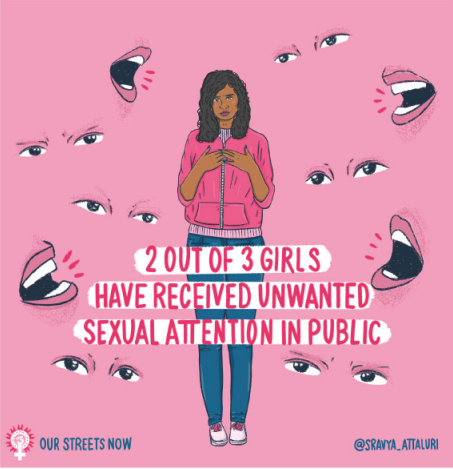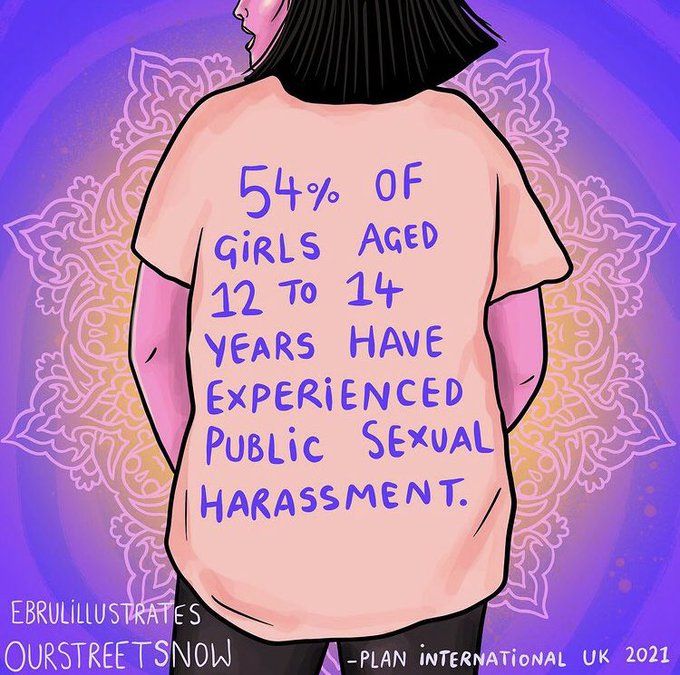Introduction
Public sexual harassment (PSH) is a form of gender-based violence which impacts the lives of young people as they navigate physical and online spaces. It is possible for any young person, including young men and boys, to be affected by PSH. Available data and research do reflect that it is disproportionately experienced by women, girls and marginalised groups, with experiences of harassment intersecting with social identities such as race, ethnicity, sexuality, gender and disability.

Need more?
Thank you for visiting our resources pages. These are free to everyone as is our fortnightly safeguarding bulletin – general safeguarding information is too important to restrict. Become a member to access lots more, including training materials for you to deliver in-house on each topic in Keeping Children Safe in Education.
Sign up for FREE fortnightly bulletin.
What about training?
We can deliver training for your setting on this and other subjects via online platforms, or face-to-face in certain areas. Just get in touch to discuss your requirements.
Definition of public sexual harasssment
Public Sexual Harassment (PSH for short) is part of gender-based violence. It comprises unwelcomed and unwanted attention, sexual advances and intimidating behaviour that occurs in public spaces, both in person and online. It is usually directed towards girls, women and often oppressed groups within society. However, it can be experienced by all.”
Our Streets Now
Our Streets Now uses the term ‘public sexual harassment’ to reflect the reality that these experiences do not only happen in the street; PSH occurs in gyms, parks, on public transport and online. PSH encompasses behaviours such as sexualised comments, sexualised jokes, noises, grabbing, flashing or receiving unwanted sexual messages and photos.
PSH is not something that anybody consents to. Consent is about having the freedom and capacity to choose as defined in Keeping Children Safe in Education. It is common for perpetrators to reframe somebody’s experience of PSH to dispense with the need for consent, framing it as a prank or harmless fun. This is a cultural issue that needs to be addressed, echoed by the findings of Ofsted’s (2021) ‘Review of sexual abuse in schools and colleges’.
Prevalence
A 2021 report by APGG for UN Women found that 71% of women surveyed had experienced some form of sexual harassment in a public place, rising to 86% amongst 18-24 year olds. The most recent Girls’ Attitude Survey (2023) highlights how public sexual harassment continues to impact young girls both in-person and, increasingly, online. The report reveals that 59% of girls aged 13-21 worry about being sexually harassed at school, in public or online and 44% of girls aged 11-21 have been shouted at or whistled at on the street on the way to and from school. A Plan-UK survey found that 35% of girls in school uniform have been sexually harassed.
PSH is experienced increasingly online as advancements in technology continue to facilitate new forms of violence and abuse. In their 2021 report, Plan-UK found that 13% of those surveyed have been filmed or photographed by a stranger without their permission. In online spaces, 73% of those surveyed in the Girls’ Attitude Survey (2023) reported receiving unwanted sexual photos. An increase in women’s experiences of PSH online has been reported since the pandemic.
Impact
The impacts of PSH are wide-ranging and can affect somebody’s social, psychological, emotional and physical lives. Women and girls often feel they must perform “safety work” to avoid PSH from happening to them: this fear can dictate where they feel safe to go, how they feel safe to dress and the actions they feel they must take to prevent PSH from happening to them. Girls and young women are subjected to PSH from a young age (see research from Plan-UK, 2018), having an immense impact on their comfort and confidence in navigating public spaces.
The impacts of PSH are compounded by poor organisational responses when young people do feel able to report. In a survey of secondary school pupils conducted by Our Streets Now, the majority of those surveyed stated that they would not report their experiences to their school or college because of the belief that they would not be taken seriously. Many reported that they did not know how to report an incident. Fewer than 20% of pupils who reported had a “vaguely positive” or “positive” response.
Keeping Children Safe in Education recognises that sexual harassment can “violate a child’s dignity, and/or make them feel intimidated, degraded or humiliated and/or create a hostile, offensive or sexualised environment”.
PSH is often committed on multiple and interlocking grounds relating to a person’s range of social identities such as gender, race, sexuality and disability. For example, black women report racism as part of their experiences of public sexual harassment. It is important that we treat all disclosures of PSH seriously and remain mindful of unconscious biases which might impact our professional responses. For example, if a young black woman reports PSH, remaining conscious of the ‘adultification’ of black children (where black children are seen as stronger, more mature and less needing of support, or where responses to trauma might be treated as behavioural challenges) is crucial to ensure that appropriate long-term support is provided.
A report published by APGG for UN Women (2021), which surveyed of more than 1000 women of all ages, found that:
"Studies have consistently shown that a significant number of women and girls have experienced sexual harassment throughout their lives, and that it continues to be a problem […] Studies have also shown that location, time of day, and intersectional factors such as ethnicity and sexual orientation, can play a role in women’s experiences of sexual harassment."
Girlguiding’s Girls’ Attitude Survey (2023) reports that girls who identify as LGBTQ+ are more likely to experience harassment on their way to and from school (55% vs 42% who aren’t) as well as girls with disabilities (53% compared to 43% who aren’t). Those who identify as transgender can also experience high rates of harassment, misogyny and transphobia when in public.
The misconceptions around who experiences PSH create barriers to disclosure and can influence professional responses. PSH, and all sexual violence, is about exerting power and control; it is not about sexual or romantic attraction.

What to do
Whole-setting approaches are necessary for the prevention of PSH and all forms of sexual violence. Whilst whole-school approach models vary, there are several core elements which are vital to the prevention of PSH and to support those who have experienced it:
- Ensure PSH features in child protection policies and procedures.
- Deliver education on PSH within the curriculum.
- Have clear and accessible reporting procedures in which disclosures of PSH are taken seriously.
- Provide long-term support.
- Challenge inappropriate behaviour, attitudes and language.
- Model healthy and respectful relationships.
DSL Training Materials
-

Public Sexual Harassment Presentation
-

Public Sexual Harassment - Presenter notes
-

Handout for staff - Public Sexual Harassment
-

Public Sexual Harassment – Quiz
-

Public Sexual Harassment – Quiz (Answer Sheet)
-

Public Sexual Harassment Scenario (primary schools)
-

Public Sexual Harassment Scenario (primary schools) – DSL Information Sheet
-

Public Sexual Harassment Scenario (secondary schools)
-

Public Sexual Harassment Scenario (secondary schools) – DSL Information Sheet
-

Public Sexual Harassment Scenario (16+)
-

Public Sexual Harassment Scenario (16+) – DSL Information Sheet
-

Public Sexual Harassment Scenario (SEND)
-

Public Sexual Harassment Scenario (SEND) – DSL Information Sheet
-

Public Sexual Harassment Scenario (care settings)
-

Public Sexual Harassment Scenario (care settings) – DSL Information Sheet
Resources
-

Our Streets Now
Save time and improve your safeguarding approach…
Bite-size training materials to share with your staff every month.
Support to explore and develop your safeguarding culture.
A huge array of resources and professional experience at your fingertips.
Get in touch now for a personal tour of the site and details of membership benefits.
We look forward to working with you.

